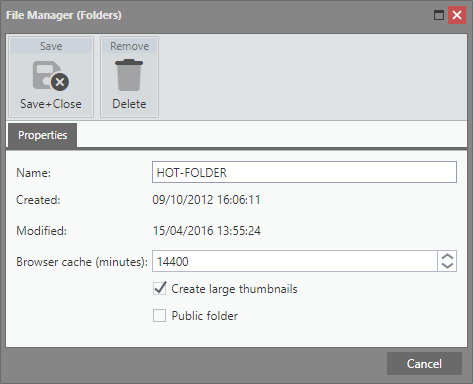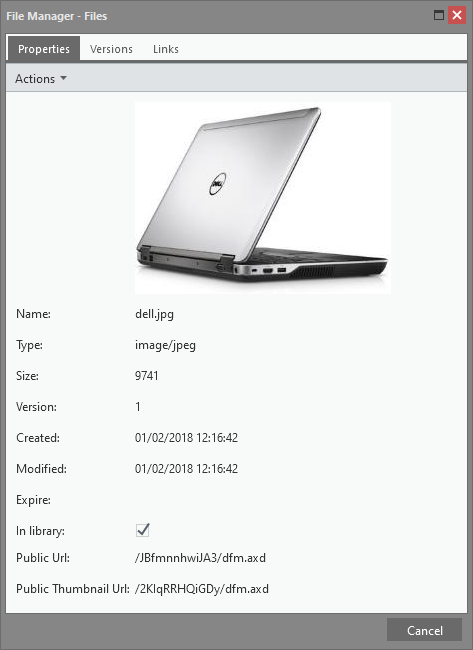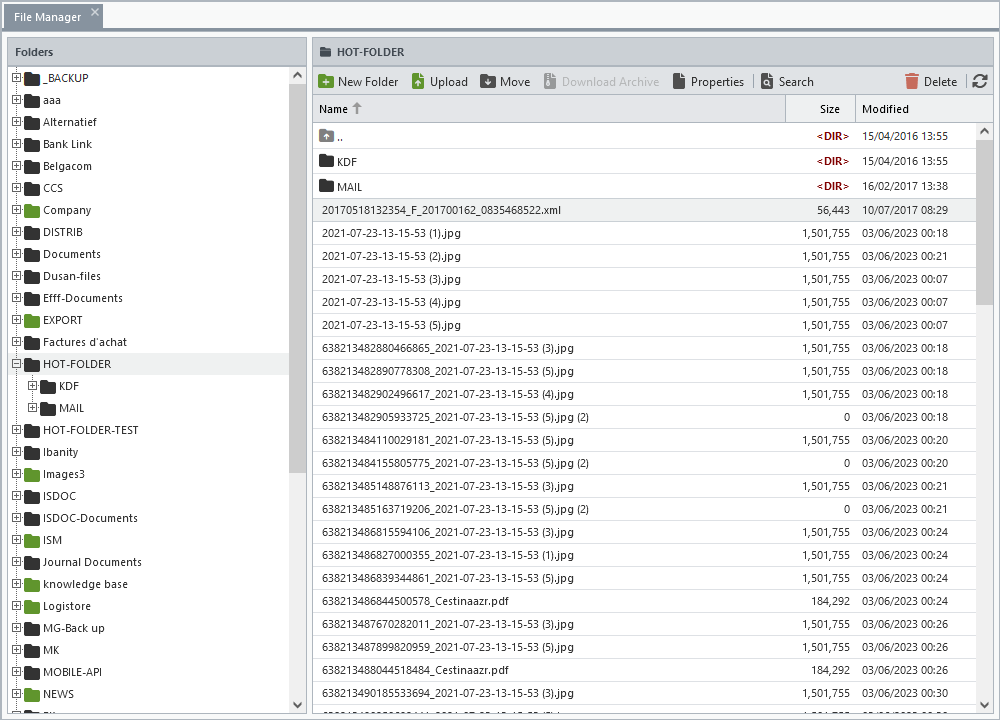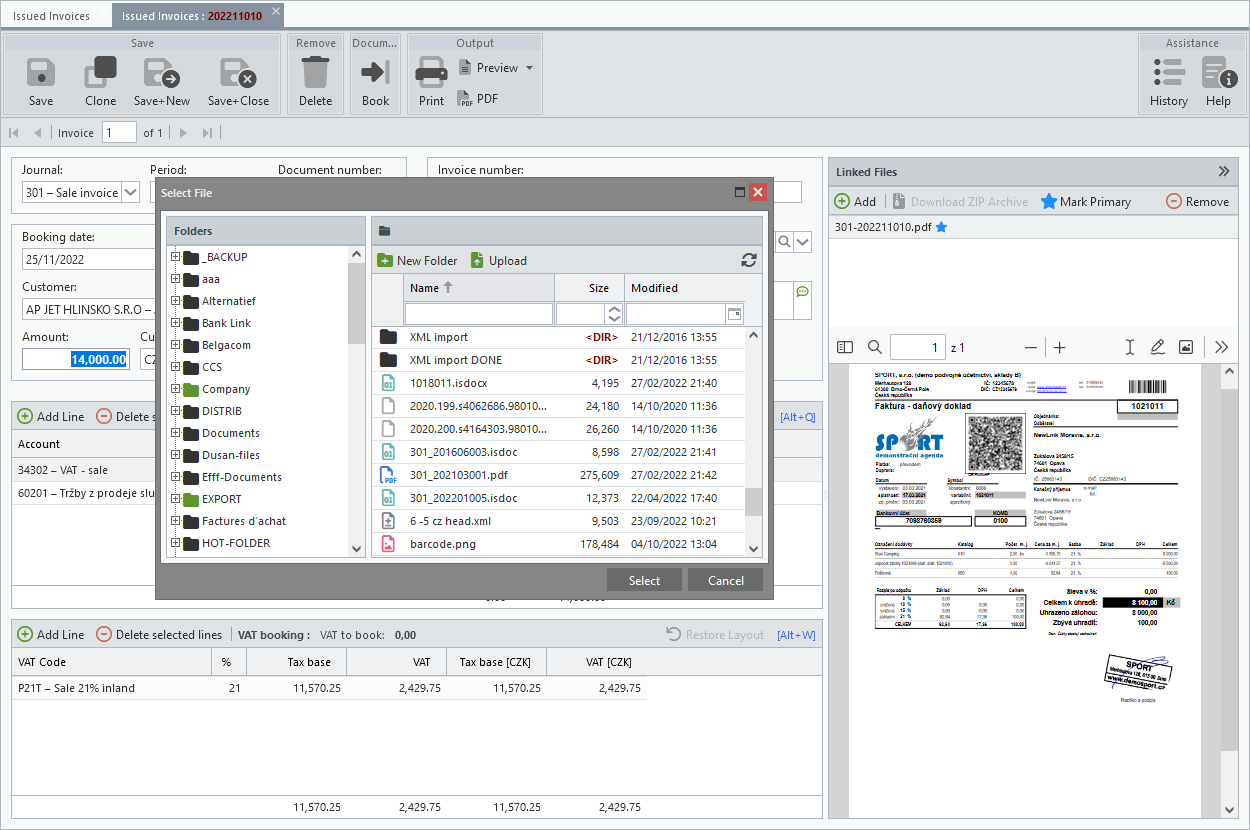The module allows you to register and manage the files that Allegro applications work with within one client. Physically, the files are stored in an internal directory structure under their own coded names. They are therefore not traceable under their real names (e.g. using the operating system file explorer) and can only be accessed via this manager.
The directory structure can be created as needed, and the files support versioning.
The directory structure can be created as needed, files are registered in the manager using the Upload button. If file versioning is enabled by the system administrator, when a file of the same name is uploaded, the original version is automatically saved to the archive before being replaced by the new one.
The manager is composed of two panels. The left one is used only to display the entire directory tree. When a folder is selected, its contents is loaded into the right pane and control (focus) is transferred to the first row of this list. It can then also be navigated using keyboard shortcuts.
Folders and files can be moved between panels and within the right panel using the Move button or by dragging and dropping with the mouse.
If more than one file is selected in the manager, the Download Archive button becomes enabled, allowing the selection to be compressed into a ZIP archive named dfm-files.zip and then downloaded to the user's computer.
The Search button opens a window where an file mask using wildcard characters can be entered. Found files whose name matches the specified pattern are listed under the search expression.
Folder Properties
If a row with a folder is selected in the manager, clicking Properties or pressing F3 opens a window with information about the selected directory. This can be renamed and you can also specify the length of time that the files of the directory will be held in the browser cache after loading.
If the Create large thumbnails option is checked, then previews are generated for the files in the largest of the three sizes offered by the library used for this action.
If Public folder is selected, public URLs are generated for files placed in this directory to access the files from the outside, i.e. without logging into the Allegro Framework.

Folder properties
File Properties
When a file row is selected in the manager, clicking the Properties button or pressing F3 opens a window with information about the selected file. If a preview of the file is available, it is displayed on the first tab, along with the public addresses of the preview and the file itself (if the Public folder option has been checked for the directory).
Date Expire indicates how long the file will be accessible. After this time, the file is automatically deleted (permanently removed from storage).
The physical existence of the file is indicated by In library flag. As a result of an unexpected error, an entry referring to a file that no longer exists may appear in the manager.
Other tabs provide an archive of file versions with the possibility of downloading them and a list of links to the data records to which the file is attached.

File properties
Keyboard Shortcuts
If the focus is in the right pane, keyboard shortcuts can be used to move between files and directories. They can also be used to invoke certain actions on folders and files.
Shortcut |
Description |
|---|---|
Arrow down |
next row |
Arrow up |
previous row |
Arrow right |
last row |
Left arrow |
first row |
Enter / Double click |
download file (manager) / attach file (selector) |
Backspace |
return to previous (parent) folder |
F2 |
upload new file |
F3 |
open properties window |
F7 |
create new folder |
F10 |
create ZIP archive and download it |
Delete |
delete folder or file |
Attaching to Data Record
Files registered in the manager can then be attached to data records (scanned invoices, production documents, product photos, ...). To select a file, a selector is opened in a separate window (Add button), which is a full-fledged file manager in which you can work with the directory structure or upload or delete files just like in a stand-alone application.
Once a file is attached, it is included in the Linked Files panel and a preview is available for the selected types.
The keyboard shortcuts in the file selector are the same as in the file manager, only Enter does not download the file, but attaches it. Multiple file lines can be selected and attached at once before using the Enter key.
The same applies to double-clicking on a file line - in the selector the link is made, while in the manager the download is started.
The same rules apply to row selection as for the list.

